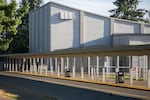
FILE-David Douglas High School’s south building in September. The school is one of the largest and most diverse public high schools in Oregon.
Elizabeth Miller / OPB
The student athletes and coaches for David Douglas High School’s football team in Portland say they’ve faced racist chants and slurs during most of their away games. David Douglas is one of the largest and most diverse public high schools in Oregon.
Volunteer Assistant Coach Marcell Frazier says some of the worst treatment happened recently at Adrienne C Nelson High School in Happy Valley, Oregon.
“Within that 48 hours, we had a student throw items at our fans,” Frazier says. “We had a student make monkey noises at a coach. We had players, multiple players indicate that they were being called slurs and being cursed at, to the point they were brought [to] tears.”
Since the most recent incident at Sam Barlow High School, administrators have identified a student athlete who used a racial slur against one of the David Douglas players. A spokesperson for Barlow says the school is following Oregon School Activities Association procedures, they’ve been in contact with the student and their family and the student will face “appropriate consequences.”
Frazier has been drawing attention to the incidents on social media and came to the OPB studios to talk about it.

FILE-David Douglas High School in September, 2023. The student athletes and coaches for David Douglas High School’s Football team in Portland say they’ve faced racist chants and slurs during most of their away games.
Caden Perry / OPB
The following transcript has been edited for clarity and length.
Jess Hazel: The Oregon School Activities Association has said that they have a zero-tolerance policy for this kind of behavior and that they’re investigating these different incidents. What’s your response to how OSAA has handled things so far?
Marcell Frazier: Everybody has due diligence and a process that we must follow. But I just hurt for the kids. I would hope that the OSAA is doing their due diligence to investigate. Me personally, I didn’t come into this situation with much hope. When I made those posts on Facebook and Instagram I just felt that the community needed to know what was actually happening, especially since we documented it so well week by week.
Hazel: And unfortunately, this isn’t the first season that student athletes have faced racism during games. What do the community and school administrators need to be doing differently to address this problem long term?
Frazier: I think that absolute zero-tolerance policy has to be enforced. Games need to be discontinued because one way to kind of change the culture is you start taking away some of the games. That would be huge.
But I also think the legislation that Ms. Janelle Bynum introduced in 2019, which is the House Bill 3409 that state schools can lose their membership in the OSAA if it’s found that their community or their athletes or their players or parents are abusing other teams in a racial tone. So maybe that House Bill needs to be rethought, rewritten, reintroduced, maybe, but it feels like the OSAA has the bylaws and the state has the House Bill in order to enact some change. But I hope they use it here eventually.
Hazel: Student leadership at David Douglas put out an official statement on their social media. Basically, they are calling on people to acknowledge the racism and then support the student athletes at games. What other responses have you been hearing from kids in the district and the community in general about how to move forward?
Frazier: Just to acknowledge one, a lot of kids from Park Rose and Centennial and parents from Jefferson and parents from Benson and some of the quote-unquote, “more diverse schools” have reached out and said, “Yeah, of course, this has happened for decades.” This has been documented as recently as last year with the Jefferson versus Medford incident where Jefferson had multiple players kicked out for fighting after receiving racial language.
So we did a service project cleaning up our community and one thing I floated to the administration was these schools where racist incidents are happening, imagine if they did a joint service project within Hazelwood. Hazelwood being such an area for growth in such a high needs area. What would it look like when you bring those kids down from the hills and you take them down to the corner of 122nd in Burnside? And that’s kind of like the heart of the fentanyl crisis in East County.
A place where more than likely those students would not feel safe, our students walk through that and live that every single day. So that was an idea I floated to the administration. Will it gain traction? I don’t know. I don’t know if anything is going to gain traction outside of putting out an anti-racist statement. Which we know in this day and age, that’s kind of the route people go.
Hazel: How else has this affected your student athletes emotionally? I mean, there’s so many different ways that this can impact student life.
Frazier: First you have to look at the mental and emotional state that they already bring into just a practice or a school day. It’s already pretty significant.
But to see the body language now and to see almost like, “Well, here we go again” and them looking defeated at times and them crying. I think our kids are resilient but they’re getting hit at all angles. They’re getting hit with gun and gang violence. They’re getting hit with the fentanyl crisis. They’re getting hit with the houseless crisis. And they’re getting hit with food insecurity being their neighborhood has some of the least amount of accessible grocery stores in walking distance.
I think this vulgarity and the racism, or just the racial slurs if it’s not flat out racism, I think it’s just a lot for them to handle. And we will never know the emotional impact, right? We will never know the PTSD or the trauma that they may have from this event moving forward.
Related: Related: Three Black students in OPB’s Class of 2025 take three different paths toward graduation
